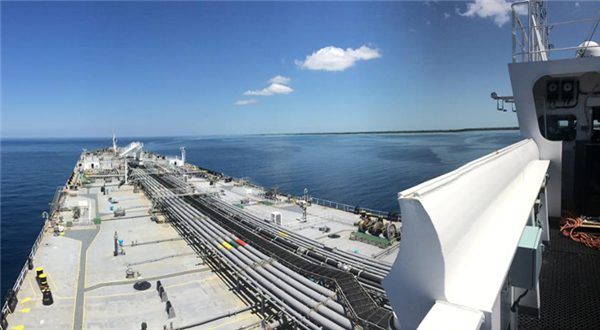West Africa now global hub for clean floating storage
More than 70% of unsold or surplus gasoline, diesel and jet fuel is stored on tankers at anchor off Togo or Nigeria
WEST Africa is now the world’s floating storage centre for clean products, with 73% of unsold or surplus gasoline, diesel and jet fuel now on tankers at anchor off Togo or Lagos, Nigeria.
Around 21.7m barrels of product is tracked being stored on 33 tankers outside these ports, according to data from Lloyd’s List Intelligence.
Global clean storage is assessed at 29.7m barrels on 51 vessels, data shows. The figure excludes Iranian-owned tonnage now being used for floating storage which is unable to trade because of US sanctions.
Oil traders have increasingly used West Africa as a clean products transhipment hub in the past few years as cargoes are shipped from east to west around the Cape of Good Hope on larger tankers.
The tankers, including some very large crude carriers on their first voyage, store primarily middle distillates and other refined products, with the area used as a waiting or transhipment zone until sales are concluded. Cargoes are then placed on smaller vessels via ship-to-ship transfers and sail to their final destinations, usually northwest Europe.
Volumes in storage off West Africa surpass those seen off Southwold on the UK’s east coast, which until now has been viewed as the Atlantic’s largest floating storage hub.
During 2015 and 2016, when oil product prices were in contango and promoted floating storage, the majority of the ships were at anchor around Southwold in the North Sea.
The waters were viewed as safe haven for not only laden vessels, but for vessels in lay-up or without employment. The region is also regularly used for STS transfers, and some 10 clean and crude cargoes are currently seen in the waters off the port for the past 20 days or more.
This time West Africa is in the middle of the global surplus of refined products, as slower European demand for land transport fuels leaves oil traders and refiners with unsold cargoes.
The market contango, when the future price is higher than the spot price allowing traders to buy and store on ships for later sale at a profit, narrowed over the past four weeks, making it unlikely that all vessels are being used for this purpose.
Global demand for jet fuel has crashed and is at 20% of levels seen before the coronavirus lockdown, while gasoline and diesel demand is being closely watched to determine the size and scope of any rebound.
The winding down of inventories, including those on tankers, is among the first indicators of any market rebalancing.
In addition to clean products, crude from Venezuela is also tracked being shipped to offshore of Togo’s capital city Lomé in greater volumes since the end of 2019, where it is held in floating storage on tankers awaiting sale to Asian countries. Often these cargoes are transferred on to other tankers for the last sector of the voyage.
Vessel tracking shows a handful of crude cargoes in floating storage off West Africa.
Overall, floating storage of clean and crude cargoes has risen to a record 292m barrels on 130 tankers, gaining 24% over the past month. When Iranian-owned or controlled vessels are removed, that figure is calculated at 193.8m barrels, according to Lloyd’s List Intelligence data. The rise reflects port discharge delays amid a continuing shortfall in land-based storage which has added more tankers to the floating storage list once they have been waiting for 20 days or longer.
A further four very large crude carriers and three suezmax tankers off Indian ports were added this week, in addition to the addition of 11 more waiting around Singapore and Malaysia pending sales or orders to sail to a final destination.




